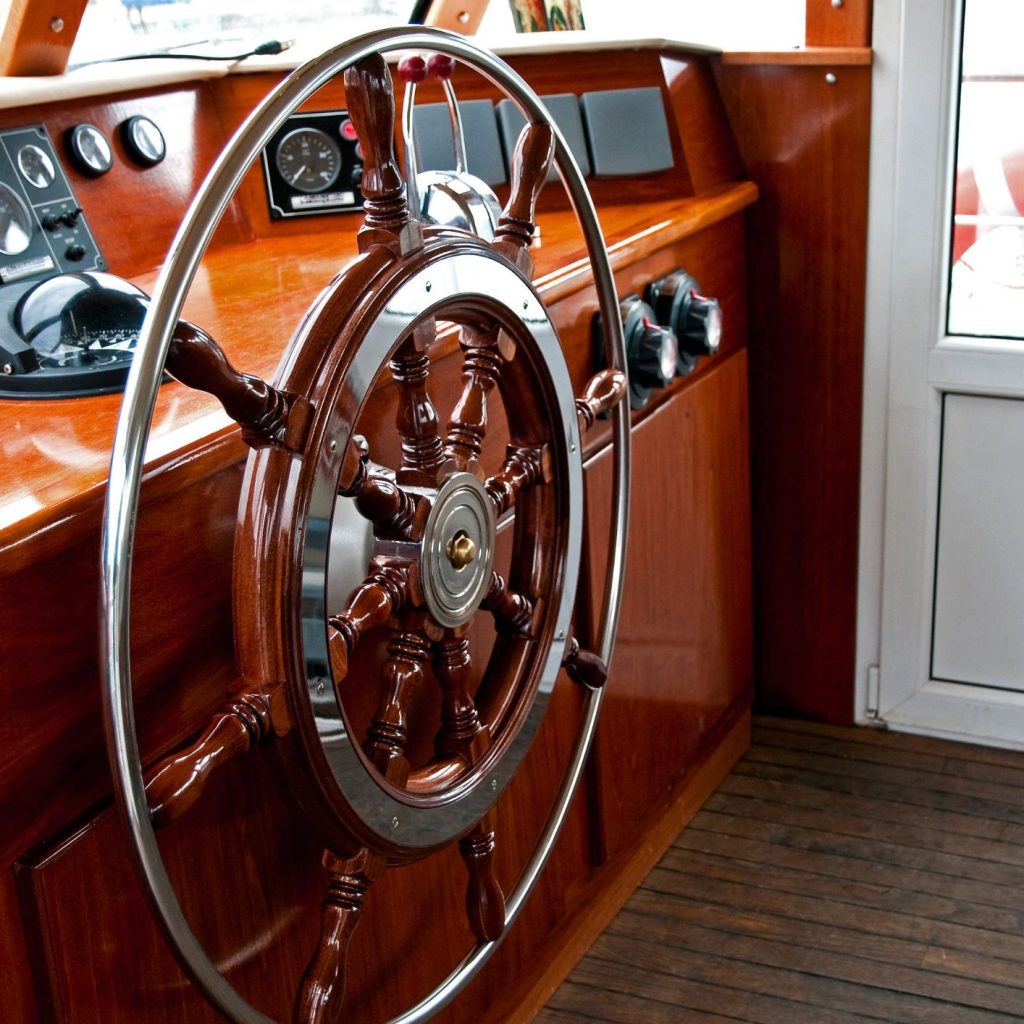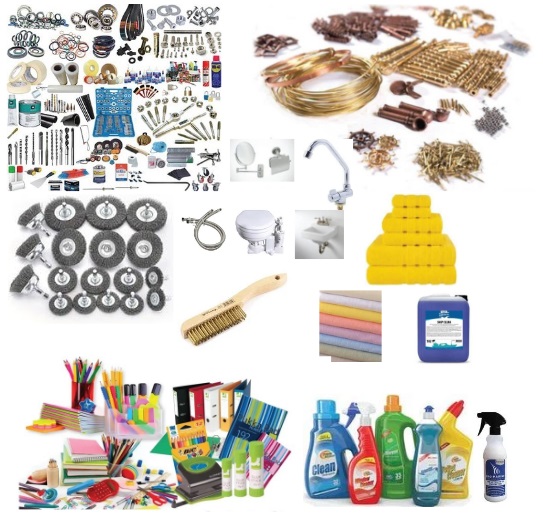
Stationary– Stationery plays a vital role in the daily operations of ships, facilitating efficient communication, documentation, and organization. Onboard, various administrative tasks require a wide range of stationery items, such as pens, notepads, logbooks, binders, and forms. One of the primary uses of stationery on ships is record-keeping. Important documents such as navigational logs, engine performance reports, cargo manifests, and crew duty rosters need to be accurately maintained for operational efficiency, regulatory compliance, and safety. Logbooks are particularly crucial, as they serve as official records of the ship’s journey, weather conditions, and important events during the voyage. Additionally, stationery items are essential for communication on board and with shore-based offices. Ships often rely on printed forms, checklists, and reports for clear communication between different departments, such as the bridge, engine room, and galley. Crew members also use stationery to draft letters, issue memos, and fill out safety or maintenance checklists. Beyond administrative uses, stationery is important for personal use by the crew, who may write letters, keep journals, or engage in study during long voyages. In short, stationery is indispensable for both the operational and personal needs of those working aboard ships, ensuring smooth, organized, and well-documented maritime activities.
General hardware-General hardware on ships is essential for both structural integrity and the smooth functioning of everyday operations. This category includes a wide range of components such as nuts, bolts, screws, hinges, locks, brackets, and clamps, all of which are crucial for maintaining the ship’s physical framework and ensuring the secure attachment of various fixtures and fittings. These small yet vital pieces of hardware hold together parts of the ship, from the hull to the deck fittings, ensuring that everything remains stable and secure during the ship’s movement in challenging sea conditions. Additionally, general hardware is used in maintenance and repair work. Crew members rely on these items to perform regular upkeep, whether it’s tightening loose fittings, securing cargo, or fixing mechanical issues. Hinges and locks ensure that doors, hatches, and compartments are properly sealed and secured, protecting the vessel from water ingress and ensuring safety during rough seas. Brackets and clamps help in organizing cables, pipes, and equipment, keeping everything in place and reducing the risk of accidents. General hardware may also be used in assembling and securing ship equipment, making it indispensable for the ship’s overall operation, safety, and longevity by facilitating repairs, modifications, and maintenance tasks.
Brushes & Mats– Brushes and mats are essential for maintaining cleanliness, safety, and functionality on ships. Brushes are used for a variety of cleaning tasks, from scrubbing decks to maintaining engine rooms and living quarters. Deck brushes, often made with tough bristles, help remove dirt, grime, salt, and algae that accumulate on the ship’s surfaces due to constant exposure to the marine environment. Cleaning brushes are also vital for removing rust from metal surfaces and applying protective coatings like paint or anti-corrosion treatments. In engine rooms, specialized brushes are used to clean machinery and equipment, ensuring they operate efficiently and preventing breakdowns caused by dirt or debris buildup. Mats, on the other hand, play a critical role in safety and comfort aboard ships. Anti-slip mats are commonly placed in high-traffic areas, such as the bridge, galley, and engine room, to prevent slips and falls, especially in wet or oily conditions common on ships. Entry mats at doorways help trap dirt and moisture, reducing the amount of debris carried inside the ship, which helps maintain cleanliness. Mats also provide insulation and comfort underfoot for crew members working long hours on hard surfaces. Together, brushes and mats contribute significantly to maintaining a clean, safe, and functional shipboard environment.
Lavatory Equipment – Lavatory equipment on ships is essential for maintaining hygiene, comfort, and sanitation for crew members and passengers during voyages. These facilities, which include toilets, sinks, showers, faucets, and associated plumbing systems, play a crucial role in ensuring that basic sanitation needs are met in the confined and often challenging maritime environment. Marine lavatories are designed to be highly efficient in water usage, as fresh water is a limited resource on board. Specialized marine toilets, for instance, often use vacuum systems or low-flow mechanisms to minimize water consumption, ensuring sustainability during long trips. The proper functioning of lavatory equipment is critical for maintaining health and hygiene standards, particularly on ships that are at sea for extended periods. Waste management systems, including sewage tanks and treatment plants, work in conjunction with lavatory equipment to safely handle and process wastewater, adhering to strict environmental regulations. Additionally, well-maintained lavatory facilities contribute to the overall comfort and morale of the crew and passengers, helping to create a more pleasant living environment on board. Regular maintenance of this equipment is essential to prevent breakdowns or sanitation issues, ensuring the ship remains clean, safe, and in compliance with health standards.
Clothes & Linen – Clothes and linen play a significant role in the daily life aboard ships, ensuring comfort, hygiene, and functionality for the crew and passengers. Proper clothing is essential for protection against harsh marine conditions, as crew members are exposed to varying weather, including sun, wind, rain, and cold temperatures. Uniforms not only provide practical benefits, such as durability and weather resistance, but they also foster a sense of professionalism and unity among the crew. Specific garments, like waterproof jackets, safety boots, and insulated gear, are crucial for ensuring safety and comfort during various tasks and emergencies at sea. Linen, which includes bedding, towels, and tablecloths, is equally important in maintaining a hygienic and comfortable living environment. Clean, fresh linens contribute to the overall well-being of the crew, promoting good health and morale during long voyages. Additionally, ships often have designated areas for dining and relaxation, where well-maintained linens enhance the aesthetic appeal and create a welcoming atmosphere. The proper management of clothes and linen is essential for maintaining order and hygiene on board, as they require regular washing, storage, and replacement. Ultimately, clothes and linen contribute significantly to the quality of life on a ship, making them indispensable for both functionality and comfort.
Cleaning Material & Chemicals – Cleaning materials and chemicals are crucial for maintaining the cleanliness, hygiene, and operational efficiency of ships. In the maritime environment, where exposure to saltwater, oil, and other contaminants is prevalent, regular cleaning is essential to prevent corrosion, mold, and fouling. Various cleaning agents, such as detergents, degreasers, and disinfectants, are used to clean different surfaces, from decks and engines to living quarters and galley areas. These materials ensure that the ship remains a safe and pleasant environment for the crew and passengers. Specific cleaning chemicals are designed to tackle marine-specific issues, such as biofouling on the hull and mold in humid areas. Anti-fouling agents, for instance, are applied to the underwater sections of the hull to prevent marine growth, which can impede the ship’s performance and fuel efficiency. Additionally, cleaning materials help maintain the ship’s appearance and ensure compliance with health and safety regulations. Regular cleaning routines using appropriate chemicals reduce the risk of slips and falls on wet surfaces and contribute to overall crew well-being. Proper handling and storage of these chemicals are also essential to ensure safety onboard. In summary, cleaning materials and chemicals are vital for the maintenance, safety, and efficiency of ships in the demanding marine environment.
